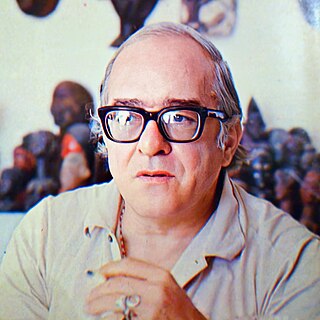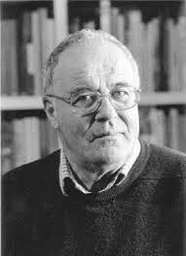Related Research Articles

Marcus Vinícius da Cruz e Mello Moraes, better known as Vinícius de Moraes and nicknamed O Poetinha, was a Brazilian poet, diplomat, lyricist, essayist, musician, singer, and playwright. With his frequent and diverse musical partners, including Antônio Carlos Jobim, his lyrics and compositions were instrumental in the birth and introduction to the world of bossa nova music. He recorded numerous albums, many in collaboration with noted artists, and also served as a successful Brazilian career diplomat.

Askia Muhammad I (1443–1538), born Muhammad ibn Abi Bakr al-Turi or Muhammad Ture, was the first ruler of the Askia Dynasty of the Songhai Empire, reigning from 1493 to 1528. He is also known as Askia the Great, and his name in modern Songhai is Mamar Kassey. Askia Muhammad strengthened his empire and made it the largest empire in West Africa's history. At its peak under his reign, the Songhai Empire encompassed the Hausa states as far as Kano and much of the territory that had belonged to the Songhai empire in the east. His policies resulted in a rapid expansion of trade with Europe and Asia, the creation of many schools, and the establishment of Islam as an integral part of the empire.
Terence "Terry" Osborn Ranger was a prominent British Africanist, best known as a historian of Zimbabwe. Part of the post-colonial generation of historians, his work spanned the pre- and post-Independence (1980) period in Zimbabwe, from the 1960s to the present. He published and edited dozens of books and wrote hundreds of articles and book chapters, including co-editing The Invention of Tradition (1983) with Eric Hobsbawm. He was the Rhodes Professor of Race Relations at the University of Oxford and the first Africanist fellow of the British Academy.

African studies is the study of Africa, especially the continent's cultures and societies. The field includes the study of Africa's history, demography, culture, politics, economy, languages, and religion. A specialist in African studies is often referred to as an "africanist". A key focus of the discipline is to interrogate epistemological approaches, theories and methods in traditional disciplines using a critical lens that inserts African-centred ways of knowing and references.
Roland Anthony Oliver FBA was an Indian-born English academic and Emeritus Professor of African history at the University of London.
John Donnelly Fage was a British historian who was among the earliest academic historians specialising in African history, especially of the pre-colonial period, in the United Kingdom and West Africa. He published a number of influential studies on West African history including Introduction to the History of West Africa (1955). He subsequently co-founded the Journal of African History, the first specialist academic journal in the field, with Roland Oliver in 1960.
Dame Margery Freda Perham was a British historian of, and writer on, African affairs. She was known especially for the intellectual force of her arguments in favour of British decolonisation in the 1950s and 1960s.
Cecilia Trifogli, FBA is an Italian philosopher and academic. She has been Professor of Medieval Philosophy at the University of Oxford since 2008, and a Fellow of All Souls College since 1999. Her research focuses on philosophy in the Middle Ages, including epistemology, metaphysics, and the reception of Aristotle's philosophy.
Dame Karin Judith Barber, is a British cultural anthropologist and academic, who specialises in the Yoruba-speaking area of Nigeria. From 1999 to 2017, she was Professor of African Cultural Anthropology at the University of Birmingham. Before joining the Centre of West African Studies of the University of Birmingham, she was a lecturer at the University of Ife in Nigeria. Since 2018, she has been Centennial Professor of Anthropology at the London School of Economics.
Janet Bately is a British academic, the Sir Israel Gollancz Professor Emerita of English Language and Medieval Literature at King's College London since 1977. She has a bachelor's degree from Somerville College, Oxford and began her academic career as a lecturer at Birkbeck College. Her research interests include Old English and Middle English literatures, the court of King Alfred the Great, and early modern bilingual dictionaries.
The African Studies Association of the United Kingdom (ASAUK) formed in 1963 "to advance African studies, particularly in the United Kingdom, by providing facilities for the interchange of information and ideas and the co-ordination of activities by and between persons and institutions concerned with the study of Africa." Antony Allott and Roland Oliver led the founding of the group. In recent times the Royal African Society administers the association.
Timbuktu Chronicles is the collective name for a group of writings created in Timbuktu in the second half of the 17th century. They form a distinct genre of taʾrīkh (history). There are three surviving works and a probable lost one.

John David Yeadon Peel (1941–2015) was a British Africanist, sociologist and historian of religion in Africa, particularly in Nigeria. He was most notable for his studies of historical patterns of religious belief among the Yoruba people.
Alfred Babatunde 'Tunde' Zack-Williams is a British Emeritus Professor of Sociology and Research Degrees Tutor at the University of Central Lancashire (UCLAN). He is an Africanist and a political scientist. He obtained a Bachelor of Arts degree at the University of Liverpool and a MSc at the University of Salford, both in sociology. His PhD thesis with the University of Sheffield was entitled Underdevelopment and Diamond Mining in Sierra Leone. Previously, Zack-Williams taught sociology at Bayero University Kano in 1979 and the University of Jos in Nigeria, and performed fieldwork research in Ghana, Nigeria, and Sierra Leone. He published extensively on Sierra Leone and West Africa.
Douglas Rimmer was an economist and historian focusing on post-colonial West Africa. He first taught at the University College of the Gold Coast and was a founding member of the Centre of West African Studies at Birmingham University in 1963, where he became Director in 1983. Rimmer served the Royal African Society (RAS) for twenty years in various roles such as President (1986-1988). In 2001 he received the RAS/ASAUK Distinguished Africanist Award.
John M. Lonsdale is a British Africanist and historian. He is Emeritus Professor of Modern African History at the Centre of African Studies in the Faculty of History at the University of Cambridge. He is a Fellow of Trinity College there. As a schoolboy, he spent three summer holidays during 1953-1956 in Kenya where his father had just taken a job. He read history at Cambridge from 1958 through 1964.In 1956 he started his national service as a subaltern in the King's African Rifles. His first teaching job was in Dar es Salaam in 1964. Lonsdale studied the modern history of Kenya extensively and won the Outstanding African Studies Award of the African Studies Association of the United Kingdom in 2006.
Robin C. C. Law is a British Africanist and since 2009 Emeritus Professor of the History of Africa at the University of Stirling. He obtained a BA degree in Literae Humaniores at the University of Oxford in 1967 and a PhD in History at the University of Birmingham in 1972. As a researcher, he worked at the University of Lagos, Nigeria (1966-1969) and at the Centre of West African Studies of the University of Birmingham (1970-1972). He joined the University of Stirling in 1972, and was subsequently Lecturer, Senior Lecturer, and Reader, becoming Professor of African History in 1993. He was a Visiting Fellow at the African Studies Centre Leiden (1993-1994), and a Visiting Professor at York University, Canada (1996-1997) and the Hebrew University of Jerusalem (2000-2001). Law received the Distinguished Africanist award of the African Studies Association of the UK for 2010.
Insa Nolte is an Africanist and Professor of African Studies in the Department of African Studies and Anthropology at the University of Birmingham. She obtained a first degree in Economics from the Free University of Berlin (FUBerlin) and graduated from the University of Birmingham with a PhD thesis on the history and politics of Ijebu-Remo, the regional base of the Nigerian Nationalist politician Obafemi Awolowo. After a Kirk-Greene Junior Research Fellowship at St Antony's College, Oxford, she became Lecturer in African Studies at Birmingham University in 2001. She has been Head of Department since 2018. Her research focuses on Yoruba history, culture and politics. Nolte was a president of the African Studies Association of the United Kingdom from 2016 to 2018.
Nici Nelson is an Africanist, social anthropologist and a Honorary Research Fellow in the Department of Anthropology at Goldsmiths, University of London. She obtained a PhD on Kikuyu women in Nairobi, Kenya, from the University of London in 1978 and has published on various fields such as urban anthropology, gender and sexuality, and marriage and households in East Africa. Nelson was President of the African Studies Association of the United Kingdom (ASAUK) in the years 2002-2004 and was one of the recipients of the ASAUK Outstanding African Studies Award in 2015-2016.
References
- 1 2 3 "Professor Paulo Fernando de Moraes Farias FBA". birmingham.ac.uk. University of Birmingham. Retrieved 18 August 2022.
- ↑ Gallas, Daniel (1 April 2014). "'Na África, voltei a ser cidadão', conta brasileiro exilado em 1964". bbc.com/portuguese (in Portuguese). BBC. Retrieved 18 August 2022.
- ↑ "Professor Paulo De Moraes Farias. West African history: oral traditions, chronicles, and medieval Arabic inscriptions; the interaction of Islamic and other cultural heritages in the region. Elected 2017". britac.ac.uk. British Academy. Retrieved 18 August 2022.
- ↑ "Elections to the British Academy celebrate the diversity of UK research". britac.ac.uk. British Academy. 21 July 2017. Retrieved 18 August 2022.
- ↑ "Distinguished Africanist Award". asauk-wp.s14staging.uk. African Studies Association of the United Kingdom. Retrieved 18 August 2022.
- ↑ Farias, P. F. de Moraes in libraries ( WorldCat catalog)